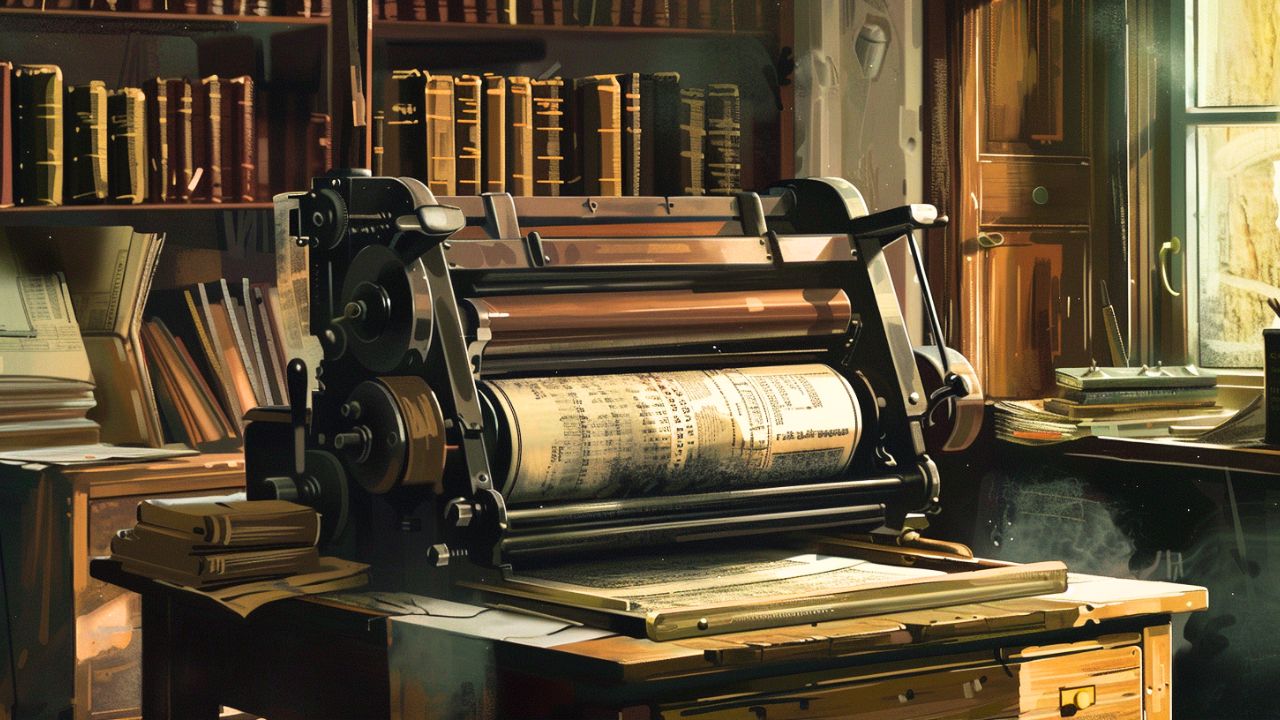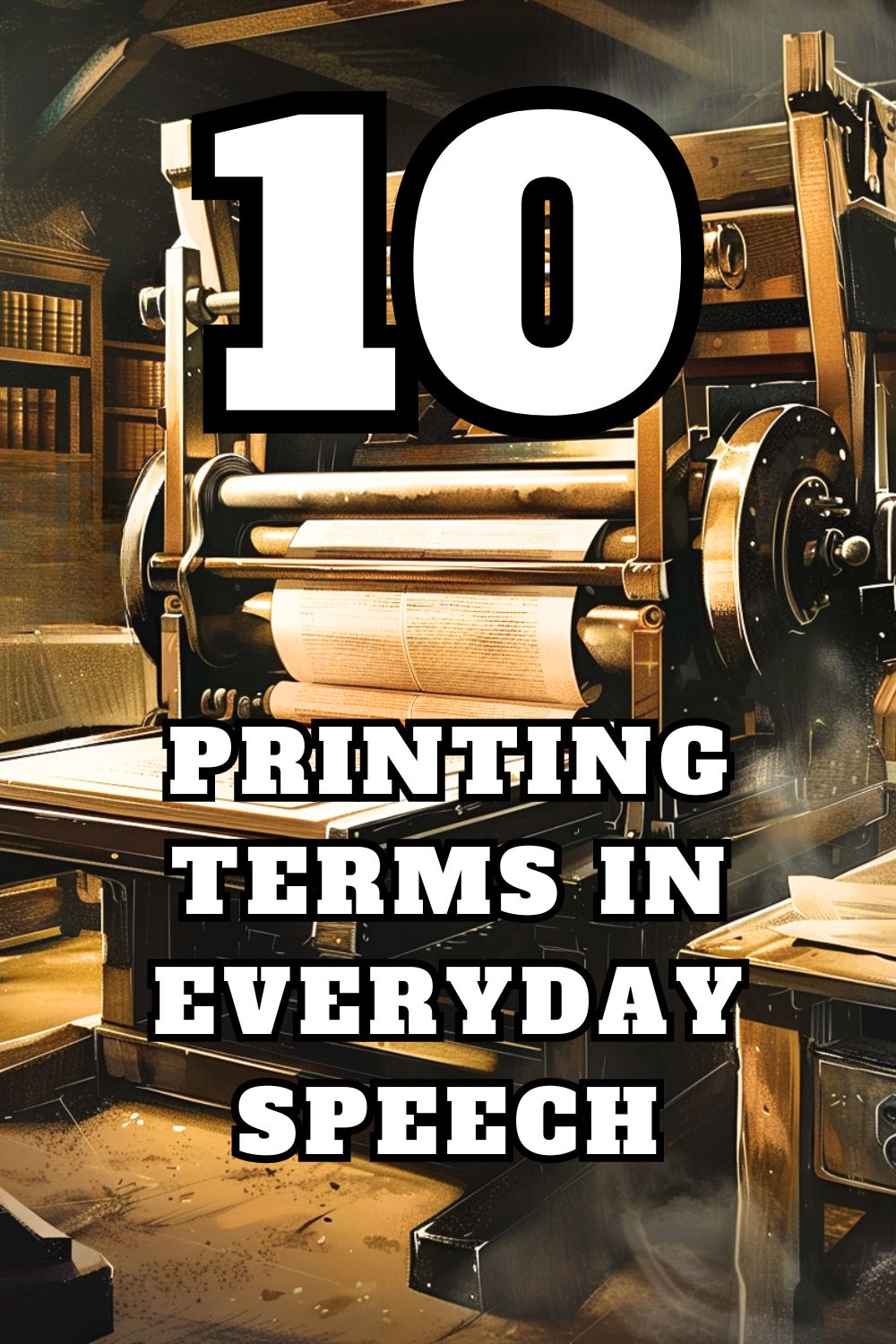Dear Linguaholics,
Did you know that many of the phrases we use every day have their roots in the world of printing? It’s true! From the bustling print shops of yesteryear to our modern conversations, these expressions have a rich history worth exploring.
In this article, we’ll uncover 10 everyday phrases that originated from printing terminology. Whether it’s about letters, typesetting, or the printing process itself, these terms have left an indelible mark on our language. Prepare to be fascinated by the stories behind these common words and phrases.
1. Uppercase / Lowercase
“Uppercase” refers to capital letters, while “lowercase” refers to small letters.
In the old days of printing, typesetters were the original multitaskers. They kept their capital letters in the upper compartments of their type cases, which were hard to reach, kind of like the top shelf in your kitchen. The frequently used smaller letters were kept in the lower, easy-to-reach compartments. Hence, “uppercase” and “lowercase” were born. Talk about organizing your desk!
Example 1: When writing a formal letter, it’s important to use uppercase for the first letter of each sentence. It shows you mean business.
Example 2: The email address should be entered in lowercase to avoid any errors. Unless you want your email to bounce back like a rubber ball.
2. Mind your p’s and q’s
“Mind your p’s and q’s” means to be careful about your behavior, pay attention to detail, and be precise in your actions.
This phrase came from the printing industry, where typesetters had to keep a sharp eye on those pesky lowercase letters “p” and “q” to avoid mixing them up. It’s also rumored that bartenders had to mind their pints and quarts. Either way, the message is clear: stay sharp!
Example 1: At the formal dinner, guests were reminded to mind their p’s and q’s. No elbows on the table, folks!
Example 2: When proofreading, it’s important to mind your p’s and q’s to catch any mistakes. Or risk writing “pubic” instead of “public.”
3. Stereotype
“Stereotype” refers to a widely held but fixed and oversimplified image or idea of a particular type of person or thing.
The term comes from the printing world, where a stereotype was a solid plate used to print identical copies of a page. This repetitive process gave rise to the modern meaning: ideas about people that are as stale and cookie-cutter as old bread.
Example 1: It’s important not to stereotype people based on their appearance or background. Not everyone who wears glasses is a genius, after all.
Example 2: The movie perpetuated the stereotype of the rebellious teenager without exploring individual differences. Because apparently, all teenagers are just dying to dye their hair neon and join a punk band.
4. Cliché
“Cliché” refers to an overused phrase or idea that has lost its originality and impact.
The term comes from the French printing industry. In French, “cliché” mimics the sound of a printing plate striking molten metal, producing identical copies repeatedly. Just like that annoying tune you can’t get out of your head, clichés are phrases that get repeated so much they lose their original punch.
Example 1: The story was filled with clichés, making it as predictable as a cheesy rom-com.
Example 2: Writers are encouraged to avoid clichés to keep their work fresh and engaging. Because nobody wants to hear about the “calm before the storm” one more time.
5. Typecast
“Typecast” refers to assigning an actor repeatedly to the same type of role, limiting their opportunities.
Originally, it meant assigning a specific type of letter or character in printing. Over time, it evolved to describe actors pigeonholed into similar roles, making it tough for them to show their range. Think of it as the acting world’s version of being stuck in a one-hit-wonder band.
Example 1: She feared being typecast as the eccentric best friend, limiting her chances to play diverse characters. Because there’s more to her than just offbeat one-liners.
Example 2: The actor broke free from typecasting by taking on a challenging and different role. Finally, he’s not just “the guy with the bad haircut.”
6. Hot off the press
“Hot off the press” means freshly printed and very recent.
This phrase comes from the printing industry, where freshly printed items were literally hot to the touch. Imagine picking up a newspaper so fresh it’s still warm—like getting a hot donut straight from the fryer. Now, it means anything brand new and just released.
Example 1: The magazine’s latest edition is hot off the press and features an exclusive interview with a trending celebrity.
Example 2: We received the breaking news hot off the press just minutes after it happened. Because who needs sleep when you have fresh gossip?
7. Print run
“Print run” refers to the total number of publication copies produced in one batch.
This term comes from the publishing industry. A print run is the number of copies printed at one time, reflecting the demand for the book or magazine. It’s like baking cookies; you make a big batch when you know everyone will want one.
Example 1: The book’s initial print run was 10,000 copies, but high demand led to a second printing. It looks like it’s a bestseller!
Example 2: Due to low sales, the print run for the new magazine issue was smaller than usual. Looks like not everyone is into knitting patterns for cats.
8. Make an impression
“Make an impression” means to have a strong effect or influence on someone.
This phrase comes from printing, where text or images are pressed into paper to create a lasting mark. It’s the same concept as leaving a memorable impact on someone, but with fewer ink stains.
Example 1: Her powerful speech made a lasting impression on the audience. They’ll be quoting her for weeks!
Example 2: He wanted to make a good impression at the job interview, so he dressed professionally. No Hawaiian shirts this time.
9. Out of sorts
“Out of sorts” means feeling unwell, upset, or not in one’s usual state of mind.
The origin of this phrase comes from the printing industry. In the days of manual typesetting, “sorts” referred to the individual letters or characters in a printer’s type case. When a typesetter ran out of a particular letter or character, they were “out of sorts,” which disrupted their work and caused frustration. Over time, the phrase evolved to describe a general state of discomfort or irritation.
Example 1: After a long day at work, he felt completely out of sorts and just wanted to relax.
Example 2: She’s been out of sorts since catching a cold last week, not quite her energetic self.
10. Black & White
“Black and white” means something is clear-cut, straightforward, or unambiguous.
This phrase originates from the early days of printing and photography, where the primary medium for text and images was black ink on white paper. The stark contrast made information easy to read and understand, leading to the metaphorical use of the term to describe clear and simple situations with no gray areas or ambiguity.
Example 1: The game’s rules are black and white—no room for interpretation or bending.
Example 2: In her view, the issue was black and white: either you supported the proposal or didn’t.

Hey fellow Linguaholics! It’s me, Marcel. I am the proud owner of linguaholic.com. Languages have always been my passion and I have studied Linguistics, Computational Linguistics and Sinology at the University of Zurich. It is my utmost pleasure to share with all of you guys what I know about languages and linguistics in general.


